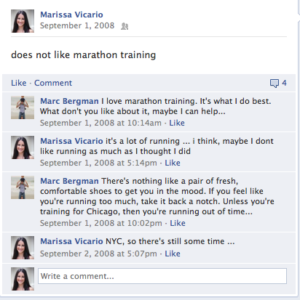I’m so very excited to profile my friend and fellow runner, Marc Bergman. I’ve been wanting to write this post forever but kept putting off asking Marc, a Jersey boy-turned-Austinite, to help me out. I mean, the guy is a marathoner (he’s done 28 to date!) and parent (a vegan one at that) among all other things so how in the heck would he have the time to be featured on this little blog?? Well, I asked and he obliged (thank you, Marc).
I probably first met Marc doing keg stands or something equally as horrendous at his frat house on campus at Northwestern University. My running career hadn’t quite caught up to my drinking routine while he was already training for marathons. It wasn’t until I started training for the ING New York City Marathon in 2008 (look for him there this year) that I really took notice of what Marc was up to running-wise when he responded to one of my “marathon training is kicking my butt”-type Facebook posts (and by the way, he was right about the shoes).
What’s really cool about this guy is his philosophy on feeding his kids nutritious food.
Keep reading for some of his tips and perspectives …
What’s your history with endurance running?
I first became a runner in the 7th grade. It was the only middle school sport that didn’t require much coordination and didn’t have cuts. I continued to run cross country and track throughout high school and even ran a few races with the running club at Northwestern. It was always my dream to run the Boston Marathon, so during the summer before my senior year of college, my friend Tracey and I decided to train for the Chicago Marathon that fall. The farther I ran, the more I loved it.
Long runs are never a chore for me. They are more like escapes into deep thoughts, problem solving, or creative thinking. When I finish, my mind hardly knows I ran. My body definitely remembers though! To date, I’ve run 28 marathons. In between, I can be found at local 5K and 10K races, but my passion is for the 26.2.
What are you training for right now?
If you asked me a year ago, I would tell you that I’ve reached my peak as a marathoner, and I’m scheduling marathons about 8-10 a year to accomplish something only about a half dozen runners have: a sub 3:00 marathon in all 50 states+DC. However, In the past year I’ve dropped another 14 minutes off of my time, and I’m refocusing. For the next 2-3 years I will race less frequently and dedicate my training to fulfill my maximum potential, whatever that may be. My next race is the ING NYC Marathon on November 4th.
What inspired you to adopt a vegan lifestyle?
One day when I was about 24 years old, I realized that for pretty much every day of my life I had a salami and cheese sandwich for lunch. I like to have little challenges for myself and I decided to be a vegetarian for 30 days. My lunch turned into a giant bowl of spinach and a piece of fruit or two. For 9 years, I have eaten a salad and fruit every day for lunch.
The 30 day challenge was a great experience and exposure to new foods and dishes, but I didn’t go vegetarian right then. It turned out for the next few years I cut out meat from my breakfast and lunch, and only had maybe 4 meat based dinners a week. I was under the impression that I needed this animal protein to sustain muscle for my marathon training.
Then one day I met Rip Esselstyn, a local Austinite known from “Forks Over Knives”. Not only is he plant-strong, he was a professional Ironman Triathlete. Speaking with him convinced me that I could get proper nutrition for endurance without animal protein, cholesterol or fat. About two and a half years ago I began to transition to vegetarian, and since at the time my son tested positive for dairy and egg allergy, I went vegan as well. I took about 6 months to transition the last animal-based meals and snacks out of my diet. I’m now 33 and have been vegan for 2 years.
One reason I stick with this diet choice is because I believe in the science behind how animal based foods alter the pH of your body to create a higher potential for disease. Another reason is that every time I look at something I’ve eaten and it looks just as it did when it came out of the ground, it makes me happy.
The day before a long run I love to carb-up on rice, quinoa, or sweet potatoes. Right before a race, I’ll have a granola bar (sometimes homemade) and a banana.
For recovery, I have been using Vega’s plant based organic nutrition products. I am usually not hungry after a long run or race, so I find it easier to throw some fruits and veggies in a blender for a smoothie.
Any specific “rules” or “guidelines” you follow?
I’m a structured person, so I generally eat on a routine every day. Fruit, nuts and cereal for breakfast, nut butter and jelly for a snack, salad and fruit for lunch, and for dinner its random: stir-fry, pasta, noodle+veggie soup, veggie fajitas, etc…
We all know some of the side effects of the vegetarian/vegan diet. (Ahem, yes, he’s referring to the roughage …) The only guideline that I follow as a runner is to stay away from foods that have “digestive implications” before important runs.
Any go-to resources (people, books, web sites, etc)?
Two trusted friends I rely on to catch my eye with a recipe are (of course) Marissa’s Well-being and Health and Elena’s eatcakeandloseweight.wordpress.com. The fact that these two women actually put time and thought into nutrition makes them stand out.
Usually I hit up the internet for recipes, and when I google something, the sites I trust the most are fatfreevegan.com, vegweb.com, and Vegetarian Times.
How about being a vegan parent?
First of all, I cook my kids meat and I feed them cheese. These are foods they like and they understand moderation. Though my kids are 6 and 4 years old, we have some relatively serious talks about nutrition. They understand general concepts like vegetables are good, candy is “bad”, and they know that bad doesn’t mean you can’t have it, but only sometimes and a little bit. We talk about how the closer food looks to the way it came from the ground, the healthier it is and what it looks like when foods are processed.
Vegetables are very fun and flexible when it comes to presentation, and sometimes that can get kids to think positive about them. When I feed my kids, they usually get a vegetarian meal, but I am pretty relaxed on feeding them cheese. I try to make a lot of their favorites homemade, like mac and cheese and pizzas, so I can incorporate vegetables into them. As is true for any meal, kids also become more interested and willing eaters if you let them participate in the preparation or have a lesson about a specific ingredient.
I also challenge them sometimes with more adventurous entrees or sides, but the lessons learned are more about trying new foods, being polite about your opinions and eating things that may not be your favorite. When you feed children, some days are just tough to make sure they are eating. To see them eat a healthy meal full of beneficial protein, vitamins and minerals is like heaven. Until they are interested in making their own decisions on their diet, I am glad that they are exposed to many different foods at a young age and enjoy learning about health and nutrition.






Leave a Reply